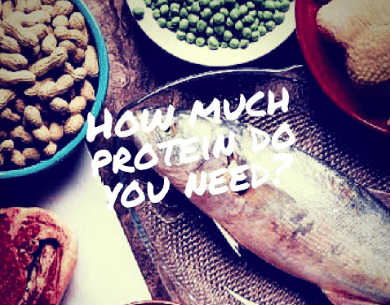How to work out your protein requirements
Athletes whether they be endurance athletes or strength athletes need more protein than the sedentary person.
Protein expedites healing, recovery and your immune system function and provides building blocks for new cells it also helps the body produce hormones and enzymes.
However protein isn’t a good fuel source for an athlete, it takes too many metabolic processes to break down efficiently for fast energy production.
The amount of protein an athlete will need depends on their gender, women typically need less as we have less muscle tissue however our requirements can change over the course of the menstrual cycle.
It also depends on the type of training the athlete does so obviously the body builder or strength based athlete typically needs more than an endurance runner although when it comes to super long endurance events that may not be the case as we will discuss later in this article.
Here are a few signs that you may not be getting enough and need to up your protein intake.
Are you constantly hungry? Athletes who are constantly feeling the need to eat, feeling weak or whose energy levels are up and down may be consuming too many simple carbohydrates but equally so they may also not be consuming enough protein. Protein makes you feel fuller for longer and has a satiating effect.
Consuming good fats also has the power to make your feel more satiated and many other beneficial side effects whereas simple carbohydrates can have a yo yo effect on your energy levels.
So if you are experiencing energy drops are feeling lethargic or tired and your blood sugar levels are showing a stable pattern but rather a mountain and valley profile you perhaps need to include more protein into your diet.
If you are also not recovering well after hard workouts, a lack of protein might be the culprit. Consuming a protein food or drink within ideally 40 minutes of your work out is a good practice. I like to take a carb/protein mix of 4 to 1.
It doesn’t necessarily need to be a protein drink but can be foods like eggs or egg whites, lean red or white meat, yoghurt, fish, nuts, seeds, beans and legumes.
Beware of low quality protein shakes full or chemical and sugars they may not be the ideal way to get your extra shot of protein in. They can lack in fibre and the natural antioxidants available form other good sources and the more processed a product is generally the worse.
Plant based proteins while good can lack in comparison to animal based proteins in some of the essential amino acids however.
If you are unable to build muscle and that is your desire, once again a lack of protein may be the culprit. Amino acids provide the building blocks for muscle growth and there are 9 amino acids that are really crucial for humans.
When my training volume is high or I am competing in ultra marathons I swear by the use of Branch Chain Amino Acids - tablets that provide all the amino acids I need on the go. It’s like having a steak with out eating the steak and even during event can help slow down the build up of lactic acid, stop me from consuming my own muscles (very important) and help me recover much much faster.
So along with electrolyte tablets I always include Branch Chain Amino Acids or BCAA’s .
So how much protein intake is required per day?
The Academy of Nutrition and Dietetics reports that although athletes only need about 1 gram of protein per kilogram to maintain muscle mass, they require 1.4 to 1.8 grams of protein per kilogram to build muscle mass;
High-Intensity Endurance Training
Endurance athletes who participate in heavy training at high intensities may need more protein than athletes trying to build muscle.
The Academy of Nutrition and Dietetics estimates that athletes who engage in high-intensity endurance exercise need 1.4 to 2.0 grams of protein per kilogram,
What are consequences though of too much protein?
It can lead to weight gain from fat. When you consume more protein than your body needs, the excess protein is used to provide your body with energy or turned into fat. You can't store extra amino acids or protein for later use, so if you consume too many calories you could put on weight.
It can also put more stress on your kidneys if you eat too much protein which might not be a problem if you are a young, healthy individual but if you have existing kidney problems this can exacerbate the problem.
It can an dehydrate you too if you eat too much protein as it takes a lot of extra water to break the protein down and to get rid of the waste it can also lead you to excreting more calcium into your urine so if you take in too much over a long period of time this could add to osteoporosis problems later in life.
In summary finding the goldilocks middle line is very important for the active athlete. Not too little and not too much if you want to maintain muscle, recover well, have a strong immune system and perform at your best.
